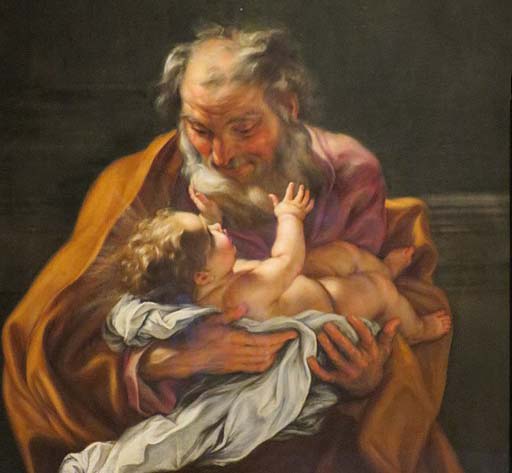St. Joseph took a silent lead in the Holy Family. Fathers should strive to follow his example, lovingly supporting their wives as Joseph did Mary in her divine motherhood. Likewise, as Joseph was to Jesus, us fathers should be to their children:
Joseph saw Jesus grow daily “in wisdom and in years and in divine and human favor” (Luke 2:52). As the Lord had done with Israel, so Joseph did with Jesus: “he taught him to walk, taking him by the hand; he was for him like a father who raises an infant to his cheeks, bending down to him and feeding him” (cf. Hosea 11:3-4).
In Joseph, Jesus saw the tender love of God: “As a father has compassion for his children, so the Lord has compassion for those who fear him” (Psalm 103:13).
In the synagogue, during the praying of the Psalms, Joseph would surely have heard again and again that the God of Israel is a God of tender love (Cf. Deuteronomy 4:31; Psalm 69:16; 78:38; 86:5; 111:4; 116:5; Jeremiah 31:20), who is good to all, whose “compassion is over all that he has made” (Psalm 145:9).
The history of salvation is worked out “in hope against hope” through our weaknesses (Romans 4:18). All too often, we think that God works only through our better parts, yet most of his plans are realized in and despite our frailty… Since this is part of the entire economy of salvation, we must learn to look upon our weaknesses with tender mercy.
The Evil one makes us see and condemn our frailty, whereas the Spirit brings it to light with tender love. Tenderness is the best way to touch the frailty within us. Pointing fingers and judging others are frequently signs of an inability to accept our own weaknesses, our own frailty. Only tender love will save us from the snares of the accuser (cf. Revelation 12:10). That is why it is so important to encounter God’s mercy, especially in the Sacrament of Reconciliation, where we experience his truth and tenderness. Paradoxically, the Evil one can also speak the truth to us, yet he does so only to condemn us. We know that God’s truth does not condemn, but instead welcomes, embraces, sustains and forgives us. That truth always presents itself to us like the merciful father in Jesus’ parable (cf. Luke 15:11-32). It comes out to meet us, restores our dignity, sets us back on our feet and rejoices for us, for, as the father says: “This my son was dead and is alive again; he was lost and is found” (v. 24).
How often I hear mothers and fathers lament, wishing they could be better as they want to be the best for their children—they deserve the best! But I facetiously remind them that if they are to blame anyone then they must blame God who chose them to be the parent of their children, and God chose them having known beforehand that they have the faults they have.
Even through Joseph’s fears, God’s will, his history and his plan were at work. Joseph, then, teaches us that faith in God includes believing that he can work even through our fears, our frailties and our weaknesses. He also teaches us that amid the tempests of life, we must never be afraid to let the Lord steer our course. At times, we want to be in complete control, yet God always sees the bigger picture.
So let us trust in God and pray for our spiritual and biological children, that God will mercifully lead them back to his home—the Father’s home—if they stray from it, or if they refuse to enter it, as did the elder brother of the prodigal son.
Blessings,
Fr. John Waiss



